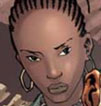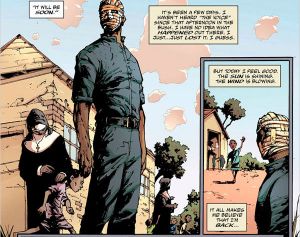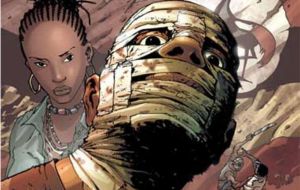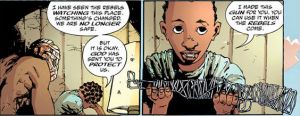Unknown Soldier: The Dysart Interview Pt. 4
By Beth Davies-Stofka
February 28, 2011 - 16:58
 |
CBB: How would you characterize the roles of the Christians and Muslims in the story?
JD: Religion is a huge, huge part of Ugandan life. The British really did conquer with the Bible before they conquered with the gun. And the Acholi, the Buganda, and all the different groups really took to Christianity. But seven to eleven percent of the population is also Muslim.
 |
I wanted to explore that! All around us, in this culture, are narratives that attack religion. And those narratives are most of the time I think well-justified. But here we had a book that was already about a Christian extremist militant in Joseph Kony, and I thought, if we can just have two characters that could represent religion at its most positive, then I feel like that would be part of changing the overall tone of the book.
I didn’t expect it at the time, but as I began to write, it really began to emerge that Sera, the “good” Christian, and Momolu, the “good” Muslim really are the best people in the book. They truly believe in what they believe, and they stick to it, and there’s a beauty to them. And if anything, they save the book from being this kind of morose dive into darkness. So it really worked out. And it really allowed me to explore religion in a way that…I’m a non-religious person. But I think there’s a need, in our culture, for some people to say some positive things about faith. Particularly Islam right now.
 |
Yes. Yes. It was so powerful to me when, in Moses’ nightmare, I mean it’s bad enough that Moses attacks Sera in his nightmare and smashes her face, but he does it while she is praying. What are you trying to accomplish there?
Throughout the work, Moses on several occasions comments in passing that he’s not religious. He says this in the first trade (note: Unknown Soldier Vol. 1: Haunted House). He says it in the chapel before the statue of the crucified Christ, and then Christ steps down to address him. He’s praying to God, but he’s praying in the way that atheists pray. They revert to some old primal programming because all else is lost.
I think Moses has a really, really strong reaction to faith, because he wants to believe in a better world and that’s going to take faith, but also all around him are people doing really horrible things in the name of faith. The entire engine of the Lord’s Resistance Army is faith. And he’s a very, very intelligent man, and he’s a modern person, and he’s having a really hard time with that.
 |
We play with faith through the whole series. He wants to give himself over to the Acholi ritual that happens at the end of the second trade, because he wants it to work (note: Unknown Soldier Vol. 2: Easy Kill). He wants it to change him, and he wants to have faith in it, but Moses isn’t a believer. He just isn’t. It’s not ever going to work. You know, that’s it. He’s just not a believer!
[laughing] What are you going to do?
[laughing] What are you doing to do? You can’t fake that shit!
Brace yourself! We complete this conversation with a serious conversation about morality. See you next week.
Related Articles:
Unknown Soldier: The Dysart Interview Pt. 7
Unknown Soldier: The Dysart Interview Pt. 6
Unknown Soldier: The Dysart Interview Pt. 5
Unknown Soldier: The Dysart Interview Pt. 4
Unknown Soldier: The Dysart Interview Pt. 3
Unknown Soldier: The Dysart Interview Pt. 2
Unknown Soldier: The Dysart Interview Pt. 1
Unknown Soldier #25: Final Issue
Unknown Soldier #24
Unknown Soldier #21
